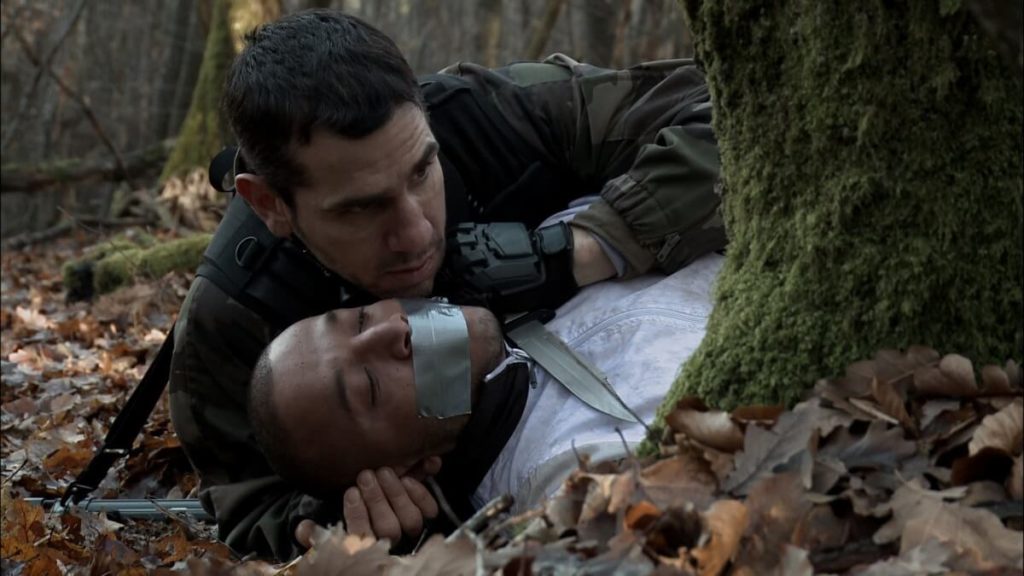Stéphane Olijnyk - Fiction - 28 min - 2010
Un jeune homme vient d’être pris au piège par Gavras, un des chasseurs du GIGN lancé à sa poursuite. Commence alors une longue marche à travers la forêt, marquée par un affrontement verbal et physique où chacun est un loup pour l’autre.
Données techniques
Année de production : 2010
Durée : 28 min
Numéro de visa : 128.098
Visa délivré le : 18/04/2011
Genre(s) : Fiction
Sous-genres : Adaptation littéraire
Thèmes : Violence, Meurtre, Mort
Langue de tournage : Français
Autre pays coproducteur : France
EOF : Inconnu
Nationalité : 100% français (France)
Formats de production : XDCamEX
Type de couleur(s) : Couleur
Cadre : 16/9
Format son : Dolby 5.1
Interdiction : Moins de 12 ans
Équipe technique
Producteur délégué : Stéphane Olijnyk
Scénaristes : Stéphane Olijnyk, Jennifer Scharwatt
Ingénieur du son : Pierre-Albert Vivet
Monteur son : Pierre-Albert Vivet
Auteur de la musique : Laurent Saïet
Effets spéciaux : Stéphane Olijnyk
Auteurs de l’œuvre originale : Jean-Bernard Pouy, Patrick Raynal
Directeur de la photo : Cédric Garnier
Monteuse : Noémie Parmentier
Scripte : Sylvie Hepp-Hauteville
Costumière : Isabelle Collin
Mixeur : Frédéric Hamelin
Sélections en festivals
- 13th Annual Fairy Tales Queer film Fesrtival – Calgary – Canada.
- Out Takes – Auckland – Wellington – New Zealand.
- 16th North Carolina Gay & Lesbian Film Festival – Durham – USA.
- Queer Lisboa 15 – Lisbonne – Portugal.
- Iris Prize 2011 – Cardiff – UK.
- Chéries-chéris (7-16 Oct. 2011) – Paris – France.
- 16th Seattle Gay & Lesbian Film Festival – Seattle – USA.
- 24.Image+Nation festival cinema lgbt (26 Oct. – 6 Nov. 2011) – Montréal – Canada.
(In an unnamed forest, a young arab is chased by 3 soldiers.
He’s got 28 minutes left , not one more, to save his ass.
There’s no time for compromise, neither with justice, nor with ethics in this manhunt . It’s a hunt ’till death. The story has been taken from the novel of Pouy and Raynal (2000).
The ennemy is invisible.
The movie keeps the spirit of the novel, an energy made of blood and sweat, without any place for thinking.
Because in this event, the characters have no time to relate their lives, they can just come to the point.
Coarse, rough, Manhunt stands further back from social movies « with message » .
We want this movie to be a masterpiece.) - Indianapolis LGBT Film Festival – Indianapolis – USA.
- Lesgaicinemad ( 3-11 november 2011) – Madrid – Spain.
- HKLGFF 2011 (18 Nov – 1er Dec 2011) – Hong Kong – China.
- 27.festival – Ljubljana (November 26 to December 4 2011 ) – Slovénie.
- Andalesgai – Festival Internacional de cine lesbico y gai de Andalucia – Sevilla – Spain
- Inside Out (May 17 to 27, 2012) – Toronto – Canada
- Kashish Mumbay International Queer Film Festival (May 23 to 27, 2012) – India
- Out in the desert 2012 – Tucson International Lgbt Film Festival – USA
Critique de Hervé Joseph Lebrun
« Chasse à l’homme », long court métrage de trente minutes qui a eu la carrière exceptionnelle d’être sélectionné dans une cinquantaine de festivals à l’étranger, est aussi le film gay le plus controversé de ce début de décennie. Dans l’hexagone, beaucoup ont crié au scandale, au film homophobe, au cinéma raciste qui regarde droit vers l’Occident. En effet, réécrit à partir d’une nouvelle de Jean-Bernard Pouy et Patrick Raynal, le film de Stéphane Olijnyk est un film de combattant politique, droit descendu de l’union de Constantin Costa-Gavras (Gavras, le nom du héros) et d’Yves Boisset. Il faut en avoir le courage. Et du courage, Olijnyk n’en manque pas, c’est sa qualité principale. Le film très plastique, plasticien, à l’image et aux bruitages froids et léchés, au son multicanal, en fout plein la vue. Les acteurs déjà, des bombes à fragmentation, aux tatouages celtiques et aux muscles de gladiateurs, vont se livrer un combat sans merci, un matin d’hiver, dans la forêt humide. Le jeu de rôles mal défini (on pense à un jeu de Clans, Nature ou Masters, où des homosexuels se chassent, le week-end) s’avère être la poursuite impitoyable des hommes du GIGN (Groupe d’Intervention de la Gendarmerie Nationale) aux trousses d’Abdelkader, un « tronc de figuier » (insulte skin, proférée dans le film). C’est bien parmi les troncs de cette forêt glacée, qu’Olijnyk, lui, joue à être Bambi, à construire les scènes avec un air de ne pas y toucher, pour tirer le spectateur vers le sordide. On y verra la touche de ses maîtres ou d’autres, Serge Leroy (« La Traque », 1975), qui transformèrent les sujets de société en grands films politiques. De ses racines ukraino-norvégiennes, il bat l’omelette à chaud : Abdelkader, un garçon de cité, « qui ne fume pas, non pas parce que le Prophète l’interdit, mais parce qu’il est asthmatique », prie Allah et Mahomet en faisant ses ablutions dans un trou d’eau, comme Narcisse, et pour qui le Coran est « fourni avec les armes et la manière de s’en servir ». Pour Abdelkader, l’important c’est la révolution et de dire merde à la République. Pour Gavras, à l’inverse, le soldat d’élite, « fils de pute et fils à papa », tous ces trucs de barbus, c’est de la vie de merde. Les joutes verbales ébranlent, et pour nous, spectateurs, ébahis par tant de rancoeur, l’affaire se corse quand Abdelkader séduit Gavras, en lui baissant la braguette, et lui suce la bite. Étirés dans les feuilles, ils vont s’aimer. La photo sublime l’union de la nature et des corps musclés. Là où Olijnyk emballe, fait preuve de courage, comme susdit, et de génie, pour un si jeune homme, c’est qu’au final l’Arabe, étranger camusien (la guerre d’Algérie n’est jamais finie), va descendre Gavras, d’une balle dans le dos, comme le font les traîtres, lieu commun de service. Gavras, lui, il commençait à s’attacher, à apprécier la fraternité interraciale. Il part finalement vers une « éternité de pouilleux ». On aime ces scènes de chasse parmi les aboiements des chiens renifleurs et les halètements. Olijnyk aveugle là où les Bambi sont rois : il souffle dans nos coeurs le mal du coeur des hommes. On assiste ici à la naissance d’un golem qui se fait dans l’humus. Il n’a peur de rien. Sans morale et sans dogme, sans blanc ni patriote, pour lui, le grand coup dans le dos, c’est de l’homosexualité ordinaire. « Je suis Olijnyk », la frime totale.
Hervé Joseph Lebrun – Lire la critique sur Allociné
Critique de Amos Lassen
We are aware of the horrors of war, especially now since we are engaged in a war where people lose their lives every day. We also have become very familiar with terrorism and have paid a high price with 3000 dead after the 9/11 terrorist attack. Yet most of us have experienced war close up and what we know about war comes to from the media and I am certainly not recommending that you live in a war zone so you can know what war is about, I did that in Israel and lived through three wars and it is not to watch death and see your friends buried. Stephane Olijnyk brings us his vision of war as seen through the eyes of a terrorist and a hunter and in 28 short minutes he shows us more than we could ever expect to see. Garvas is a hunter for the Special Intervention Unit and he goes out to take care of a young terrorist that his agency has been tracking. He captures him and as they begin a long walk through the woods, each tries to outsmart the other—and that is all I can say except that the almost half hour that you spend watching the film will keep you on the edge of your chair. As they walk they torment each both physically and mentally. You begin to question that if during wartime there are rules for being human and practicing respect. This is one of the most powerful films that I have seen in a very long time and it us brilliant. It is now on the festival circuit and we can only hope that it will find a releasing company. Olijnyk directs and he also adapted the film from a book by Jean-Bernard Pouy and stars Eric Bernard, Laurent Leca and Laurent Maurel. You do not want to miss this short film.
La Controverse
It’s great to hear that the Iris Prize is raring to go for its 2012 festival as it announces that it’s open for submissions. I attended and covered it for So So Gay last year. It was my first time there and I utterly loved it. Despite being totally knackering it was enormous fun and I’ve already put this year’s dates (10th – 14th October 2012) into my diary regardless on whether I’ll be covering the festival again, or just going on my own accord. However, this piece of news reminded me of something that I’ve wanted to pen for a while now, so I thought this might make a nice first post for this blog.
At the festival, one of what I felt were one of the weaker films at 2011’s festival was a French flick called Manhunt (to give it it’s English title) by Stéphane Olijnyk, which I described as ‘…laboured with a sense of trying too hard to be edgy, and indulged in an overt and cliché military fetishism.’ I certainly wasn’t the only person who felt this way about it, from festival goers that I spoke to. But on my round-up article for So So Gay, someone posted a comment to a link to an altogether very different review by Amos Lassen that was surprisingly positive and interesting to read.
As much as I, like any other reviewer, can get a tad defensive when having an opinion challenged (depending on how nice or nasty it’s put), I do really enjoy it when someone disagrees with me. Indeed, what I think have been some of my stronger reviews are ones where myself and Arts Desk editor, Matt Wolf, have exchanged fevered e-mails enforcing our often very polar viewpoints. I feel I end up having my own thoughts challenged and therefore can stand back from a piece better.
Confronted to a very different review of Manhunt to my own, this was no different. Of course, no review is ever wholly objective. That’s impossible. There will always be the reviewer’s own tastes and past interactions with the genre that will heavily weigh their opinion. But what about immediate factors?
Manhunt was part of a block of short films that were shown at the festival. This particular batch included the fantastically tense, violent, and erotic Spring, and the deliciously heart warming and funny Cappuccino; two of my highlights. By comparison, Manhunt appeared more than a little wounded.
When I read Amos’s review I immediately thought of several things:
1) Really?
2) Did the reviewer watch this feature by itself?
3) If not, what was the calibre of the other films it was seen with? i.e. was this the best of the bunch?
4) Reeeeeally?
Although I still stand by my opinion of the film, I do often think that I might have ended up with a different one if I viewed the film under different circumstances; if I’d seen it on its own, or if the quality of the films it was shown with had been a lot worse. Or, maybe I wouldn’t have.
Then, thinking back, the same thing happened when I wrote about May 2011’s Queer as Film event which I also reviewed for So So Gay. The film that was shown was a piece by Pierre Stefanos entitled Bedfellows which had won more than a handful of awards at previous festivals and screenings. Yet when it was shown at Queer as Film, and this is unfortunately not an exaggeration, the entire audience laughed AT it! ‘…unrealistically optimistic [and] crammed with every imaginable cliché,’ was my verdict.
However, on reflection, the films that preceded it were all British. One of them was the rather marvellous Toothless by Steven Dorrington (see embedded video), which, along with the others, was a fine example of the pessimistic and self-deprecatory dry humour that we’re famed for. Then, along came Bedfellows, which I still personally feel is a typically over-American, Disney-esque, slice of perfect, “happily ever after”, super-sweet…thing. But I do sometimes wonder that whether given the timbre of films leading up to its showing meant that myself and the other audience members rated it a little unfairly.
Both short films are obviously doing quite well for themselves despite my grumbles. Manhunt was part of the prestigious Iris Prize Festival 2011, and Bedfellows has an intimidating amount of laurels flaunted on its promotional material. Though they may not have wowed me, I still wish both films all the best, and hope that others find charm where I hadn’t. And I promise that when I review my next batch of short films, I’ll try my best to not be swayed too much by others shown alongside it.




